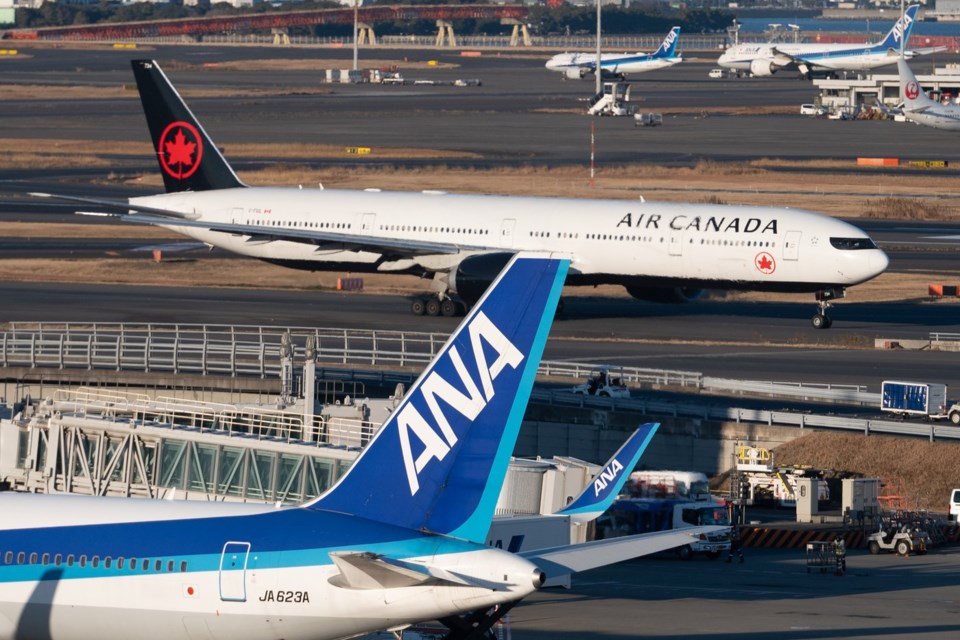MONTREAL — Air Canada lowered its financial forecast for the year as travellers continue to shy away from trips to the United States amid cross-border tensions, pushing the country's largest airline to hunt for demand elsewhere.
The company's transborder bookings have dropped at least 13 per cent — "in the low teens" — for the next six months, chief executive Michael Rousseau said on Friday, prompting the carrier to cut flight capacity south of the border.
"We observed a decline in interest among Canadians for travel to the U.S. The noise around tariffs and trade disputes definitely had an impact," Rousseau told analysts on a conference call.
"But also, we believe some travellers avoided the U.S. simply because it was expensive, with the Canadian dollar trading at levels not seen since 2020."
The company now expects adjusted earnings of between $3.2 billion and $3.6 billion in 2025 versus the range of $3.4 billion to $3.8 billion laid out earlier this year.
In a backlash against U.S. President Donald Trump's tariffs and "51st-state" musings, Canadians cancelled trips and booked flights to spots outside America over the past three months.
In March, the company reduced flights by 10 per cent to Florida, Las Vegas and Arizona — usually go-to hot spots during spring break season. Competitors WestJet, Flair Airlines and Air Transat made similar moves.
"That said, this remains contained," Rousseau stressed.
Canadians' appetite for travel has moved partly to domestic destinations, while others have sought excursions to Europe as well as Pacific shores — especially in Japan, Thailand and Australia, said network planning chief Mark Galardo.
The airline has shifted capacity accordingly. One Boeing 737 Max jetliner was snatched from a Canada-U.S. route for deployment on a new Montreal-Edinburgh route. The company launched a non-stop route to the Philippines from Vancouver last month.
And earlier this week, it announced a big push into Latin America that adds 16 per cent capacity starting in October, with Brazil, Colombia, Guatemala and Guadalajara, Mexico, all set to receive more passengers. Halifax, Quebec City and Ottawa are among the cities that will form one end of new non-stop routes to sun destinations.
Nonetheless, Air Canada dialed back plans to grow total flight capacity. In its revised outlook, it forecast capacity growth of one to three per cent versus earlier expectations of three to five per cent.
RBC Dominion Securities analyst James McGarragle said executives managed to keep a tight lid on spending, pulling off "effective cost control" last quarter.
"Advance ticket sales grew in line with their expectations, implying demand remains stable and that management is being prudent in adjusting lower their guidance," he said.
While Rousseau observed that "uncertainty was for sure the main theme" of the year, Air Canada resisted any urge to suspend its financial forecast. "This is in contrast to most U.S. airlines pulling 2025 guidance," said Raymond James analyst Savanthi Syth.
Air Canada shares closed nearly 15 per cent higher on Friday at $17.54.
On Thursday evening, the Montreal-based company reported a net loss for the three months ended March 31 of $102 million compared with a loss of $81 million in the same period a year earlier.
First-quarter revenues inched down to $5.20 billion from $5.23 billion the year before.
On an adjusted basis, Air Canada lost 45 cents per diluted share last quarter versus a loss of 27 cents per diluted share a year earlier. The result beat analysts’ expectations of a per-share loss of 54 cents, according to financial markets firm LSEG Data & Analytics.
This report by The Canadian Press was first published May 9, 2025.
Companies in this story: (TSX:AC)
Christopher Reynolds, The Canadian Press



